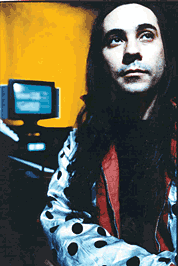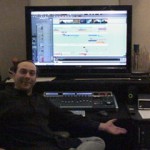PROSPERING WITH MUSIC FOR GAMES

During the past four decades, some talented guitar players have passed through Mr. C’s Music Store, including Jeff “Skunk” Baxter and the owner’s son, Shawn Clement. “Jeff used to do repairs in my dad’s shop,” says the 37-year-old musician, who grew up in Milford, Mass., and now lives outside L.A., where he’s kept busy by a constant stream of television, film and — most recently — videogame scoring assignments.
“Music was all I cared about when I was a kid,” says Clement. “I used to cut classes to practice and play gigs, but my parents didn’t complain because I got straight As.” After high school, Clement took some courses at Berklee College of Music and tried to make it in Boston playing in a fusion band. He then set his sights on the West Coast. “It started with NAMM. I played in some booths for several years and got to meet some cool people, including Neal Schon. He introduced me to the rock gods of the time. But I was into Chick Corea. It’s funny, but I’d be jamming with Eddie Van Halen and all I could think of was fusion.”
Well, not entirely. “Ever since I was a kid, I was fascinated with film music and wanted to do [that] for a living.” Clement’s demo CD, which comprises more cuts (60) than any other I’ve come across, shows a mastery of many styles, including composer and arranger Carl Stalling’s. “I listened to all those old cartoon scores, and it came in handy when I started writing music for Donald Duck cartoons myself! I love a lot of notes, whether they’re found in a Stalling score or a Jimmy Page riff!”
Knowing that Clement wanted to relocate to L.A., a friend from Berklee who was working at a record label gave him a call in the early ’90s. “My friend knew a singer who was trying to get a record deal. I came out to play in her band and ended up staying for nine months. I was sleeping on couches — doing anything to keep it together — and met a lot of people.”
Clement took a series of day gigs doing grunt work on music video sets. “I met stars on the shoots I worked on, including Michael Jackson and Nirvana. At night I played in bands. I backed up Don Johnson and Harry Dean Stanton. Those gigs were invitation-only, so I met more high-profile types.”
Clement eventually burned out and moved back East to get his groove back, but not for long. He returned in 1994 on the day of the Northridge, Calif., earthquake. “Maybe I should have taken that as an omen!” Clement says. “I took a mail room job at Sony Pictures, which was great. Besides meeting my wife, who was a lawyer there, I handed my demo to everyone who came on the lot. I was hustling all the time!”
Persistence, talent and a cassette demo eventually brought in scoring assignments, and Clement quit the mail room gig. “I couldn’t afford to put together a studio, so whenever I got a job, I’d ask a friend who had a room to let me work there. I was forced to learn how to operate all different kinds of equipment. These days, I track and mix all of my finals in the 1,500-square-foot project studio I built on our ranch, about 45 minutes from L.A.”
Judging by the award Clement received from ASCAP in 2000, there are a lot of finals to work on. “The Most Performed Underscore Award actually refers to the total number of performances a composer has on the air in one year, and that was a very good year for me!” TV work started to flow in after 1997, when he landed the Buffy the Vampire Slayer gig. “That was a stroke of luck,” Clement remembers. “Every composer in L.A. wanted that job, but somehow a demo of mine landed up in the hands of the right person and I was given the assignment. That gig let me start putting together my studio.
“I learned an important lesson the first time I handed in a score to the mixer of Buffy. There was too much bass in the mix and the cues were buried. These days, I tend to roll off some of the lower end, particularly since my scores often have lots of parts in them.”
Cakewalk SONAR 5 is Clement’s DAW of choice. “I’m a big Cakewalk fan and love SONAR 5. I recently did a demo for Cakewalk and Intel that shows off the power of 64-bit processing. I run SONAR 5 on a Rain Recording Element computer, and the pair is rock-solid. The computer I currently have has a 32-bit processor, and so I’ve ordered another Element that will run at 64 bits. I’m a big Rain Recording fan. Even on the 32-bit machine, I could play about 150 tracks with lots of plug-ins and never come close to a brick wall, although I did have to freeze some tracks, which won’t be necessary when the 64-bit Rain Element becomes my main DAW. I had 17 plug-in samplers working in real time, including eight instances of [Native Instruments] Kontakt 2 — all slots loaded with sounds, 40 or so plug-in effects — and I automated the hell out of the mix. It was crazy!”
Despite having monster guitar chops, Clement finds himself playing keyboards these days far more than any of the zillion stringed instruments he has lying around the studio. Three Yamaha 02Rs are used largely for monitoring, EQ and internal effects. Pairs of SPX990s and REV500s are comfortably ensconced in his room, along with a TC Electronic TC 2290, Eventide H3000 and Lexicon PCM90. “I’ve got other signal processors, including an old ’60s Echoplex tape delay and a Lexicon LXP-15.
“I tend to leave the REV 500s and the SPX-990s set,” Clement says. “One of these units has gate, another a ‘verb setting that I use as my main hall and another has a delay. These sounds form my basic template. When I need to create an effect for an individual cue, I generally work inside one of the Yamaha boards. I’m an old-school hardware guy, but I am beginning to use plug-ins more frequently, and 90 percent of the panning and automation moves are executed inside SONAR.”
Writing music for videogames has become a larger part of the equation for composers looking to prosper. “Videogame work is a lot different from film and television,” Clement explains. “For one thing, you’re given a lot more time to compose a game score. Television scoring requires speed; each week you’ve got to crank out another score. On the one hand, you’re writing cinematic stuff [for videogames] like any other assignment, yet there are distinctions. You have to write themes that can be looped without sounding annoying. Cues must be designed so they can transition to a variety of other cues and not sound odd, and that’s tricky. It’s almost a math problem. You’re scoring to concept, not picture, and that’s also different.”
Another distinction between the two is the need to deliver more stems to game producers, as Clement did on the score for a recent Batman game. “Batman’s duking it out with Mr. Freeze in this one, and depending on the skill of the player, either can win. So I had to write a theme for Batman and another one for Mr. Freeze. Next, I had to compose an underlying bed for the fight scenes. This bed had to be written so that elements of the main character’s themes can function as countermelodies that sit on top of it. Depending on who’s winning at any given moment, one theme or the other is called up by the program.
“Lots of layers have to be written, and all of these cues are delivered on separate stems. I generally deliver about an hour of music per game. I heard about one game where the composer delivered approximately 200 minutes of music — that’s a lot of cues, especially since none of them are very long. I’m currently working on Sony Ubisoft’s Open Season, which consists predominantly of five- to 10-second cues. This game, and the film of the same name, will be released in September.”
Still looking for the major film release that will raise his profile even higher, Clement enjoys the diversity of assignments that come his way. Not yet 40, he’s been around long enough to witness some major changes in the industry. “There are more composers out here than ever before, and much less work on the low end of the scale — libraries have taken all of that away,” Clement adds. “Reality shows have hurt the music business because they’ve lowered the quality of the product that’s deemed acceptable. Don’t get me wrong; I’ve done some of these jobs myself. But these days, it’s all looped stuff. Music editors are cutting tracks with beds and hits that are all intended to be high-impact stuff. It’s boring.
“But I love this business,” he concludes, “and I’m excited about several projects I’m working on, including the games. I’m also getting set to score Clint Howard’s feature film directorial debut, Perfect Bend. And you never know who’s going to call. I was a huge Yes fan growing up, and not long ago the phone rang. It was Jon Anderson — he had my reel playing in the background while telling me that he’d love to work with me sometime. How cool is that?”

